八年级英语 Unit One导学案
八年级英语上册导学案-Unit 1 Where did you go on vacation

Unit 1 Where did you go on vacation? 导学案Section A 1a—2c第1课时【学习目标】:1. Talk about past events2. To learn to use where questions and answers【学习重点】:学会用一般过去时态描述曾经度过的假日。
【学习过程】:1. 知识链接:1). 复习一般过去时态的意义与结构。
2). 掌握一些规则的和不规则动词的过去式。
2. 自主学习(教师寄语:Many hands make light work. )1) 要求学生小组讨论自己刚刚过去的暑假。
并写下用到的句型:____________________________________________________________________________ ____________________________________________________________________________ _______________________________2) 利用素材练习以上句型。
3)认读短语并将单词与图画匹配.4)小组活动Example: A: Where did Tina go on vacation?B: She went to the mountains.3. 听力练习1)Listen. Where did the people go on vacation? Complete the chart.People PlacesGraceKevinJulie2)Listen again. Check(√)Yes, I did or (×)No, I didn't for each question.4. 巩固练习According to the listening, and role-play the conversations between Grace, Kevin and Julie.Example: A: Grace, where did you go on vacation?B: I went to New York City.A: Oh, really? Did you go with anyone?B: Yes, I went with my mother.课后作业Show us your vacation. Whose vacation is the best(最棒)?【学习小结】(教师寄语:No man can do two things at once.)1. 总结一下本课时学到的动词短语。
新人教版八年级上册英语导学案(全册)
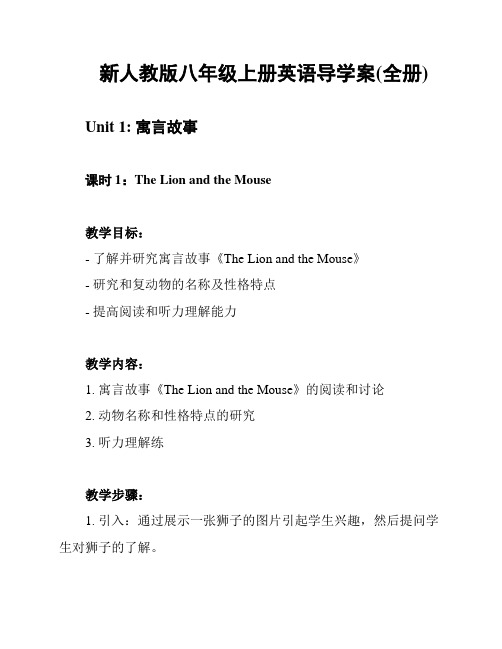
新人教版八年级上册英语导学案(全册) Unit 1: 寓言故事课时1:The Lion and the Mouse教学目标:- 了解并研究寓言故事《The Lion and the Mouse》- 研究和复动物的名称及性格特点- 提高阅读和听力理解能力教学内容:1. 寓言故事《The Lion and the Mouse》的阅读和讨论2. 动物名称和性格特点的研究3. 听力理解练教学步骤:1. 引入:通过展示一张狮子的图片引起学生兴趣,然后提问学生对狮子的了解。
2. 阅读故事:带领学生阅读寓言故事《The Lion and the Mouse》并注重理解故事情节。
3. 讨论问题:让学生回答关于故事的问题,例如:What did the lion do to the mouse? Why did the lion spare the mouse?4. 研究动物名称和性格特点:教授单词lion、mouse等动物名称,并让学生描述它们的性格特点。
5. 听力理解练:播放与故事相关的听力材料,要求学生听并回答问题。
作业:1. 抄写故事《The Lion and the Mouse》的关键句子。
2. 阅读课本上关于动物名称和性格特点的内容并做笔记。
Unit 2: 基础篮球技巧课时1:Dribbling教学目标:- 研究和掌握篮球运球的基本技巧- 提高身体的协调能力和手眼协调能力- 培养团队合作意识和体育精神教学内容:1. 篮球运球技巧的演示和解释2. 练篮球运球的基本动作3. 小组合作练教学步骤:1. 引入:向学生展示篮球运球的动作,并解释其重要性和应用场景。
2. 演示和解释:仔细演示篮球运球的基本技巧并解释每个动作的要点。
3. 练动作:让学生跟随教师一起练篮球运球的基本动作。
4. 小组合作练:将学生分成小组,进行篮球运球的练。
每个小组轮流进行练,其他组员观察并给予反馈。
作业:1. 回顾并练篮球运球的基本动作。
人教新版英语八年级下册Unit-1-What’s-the-matter第一单元导学案
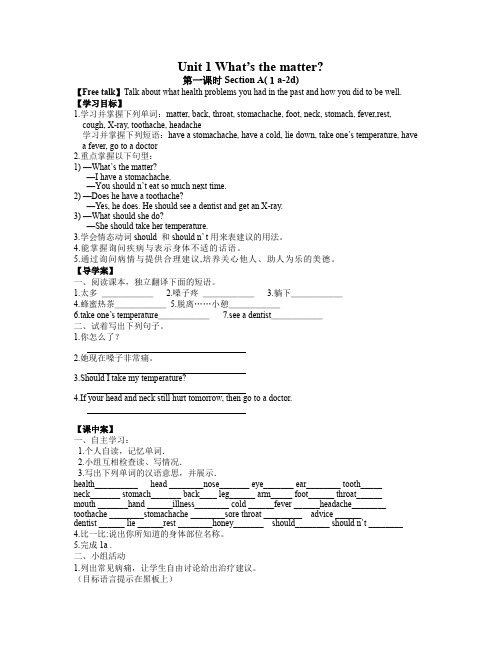
Unit 1 What’s the matter?第一课时Section A(1a-2d)【Free talk】Talk about what health problems you had in the past and how you did to be well. 【学习目标】1.学习并掌握下列单词:matter, back, throat, stomachache, foot, neck, stomach, fever,rest, cough, X-ray, toothache, headache学习并掌握下列短语:have a stomachache, have a cold, lie down, take one’s temperature, havea fever, go to a doctor2.重点掌握以下句型:1) —What’s the matter?—I have a stomachache.—You should n’t eat so much next time.2) —Does he have a toothache?—Yes, he does. He should see a dentist and get an X-ray.3) —What should she do?—She should take her temperature.3.学会情态动词should 和should n’ t用来表建议的用法。
4.能掌握询问疾病与表示身体不适的话语。
5.通过询问病情与提供合理建议,培养关心他人、助人为乐的美德。
【导学案】一、阅读课本,独立翻译下面的短语。
1.太多______2.嗓子疼______3.躺下______4.蜂蜜热茶______5.脱离……小憩______6.take one’s temperature______7.see a dentist______二、试着写出下列句子。
人教版英语八年级上第一单元导学案
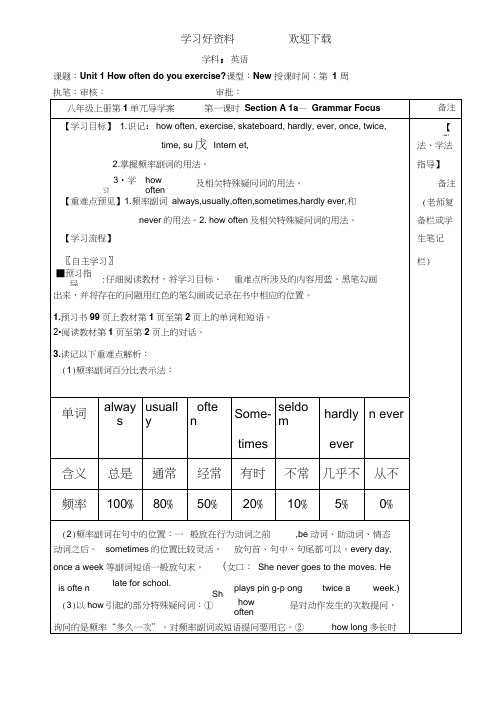
学科:英语课题:Unit 1 How often do you exercise?课型:New 授课时间:第1 周执笔:审核:审批:间,多长”,对一段时间提问用它。
③how soon (过)多久(以后)”,常用于将来时态句中,对in+时间段”提问要用它。
④how far 意为距离有多远”,是指路程的 长度。
(4)exercis e ①可数名词,"练习(题);体操;(一种)运动”。
(如:do one ' s exercises ,do eye exercises )②不可数名词和动词"运动;锻炼” 。
(如:take exercise 运动,I exercise every day. 我每天锻炼。
)。
■预习反馈:认真读记以上内容,完成下列习题〖合作探究〗:■活动1:翻译并读记下列频率副词、副词短语及句子:(1) ____________ 通常______________ ⑵有时 ____________ ⑶总是 ________ ⑷从不 ⑸经 常 _________ (6)几乎不 ____________ (7)不常 __________ (8)每天 _______________ (9) 一周一次___________________ (10) 一月两次 __________________ (11)一年三次 ___________ (12)她几乎不打篮球。
_____________________ (13)他每天吃蔬菜。
__〖问题〗 ____________________________________________________________ 〖小结〗 ____________________________________________________________活动 2: 对戈卩线部分提问 :(1) Tom never exercises. ______________________(2) ______________________________________________________________ He stayed here for two weeks. _________________________________________________________(3) ______________________________________________________________ Jim will come back in an hour. __________________________________________________________ (4) ______________________________________________________________ It "s 1500 kilometers (公里)from Chongqing to Beijing. ______________________________〖问题〗 ____________________________________________________________ 〖归纳〗 ___________________________________________________________ 〖过关检测〗 用频率副词代替划线部分改写句子(解题思路举例:six times amonth f 6/30 ~ 20/100 即:sometimes ): 1. I get up at six thirty every day . month .2. Peter watches TV five times a week .3. Jim walks to schoolfour days a 4. Bob exercises once a month .6.Tom doesn 'eat apples.7 . Lucy exercises fifteen times a month . Lucy【中考链接】1.— _______ do you have an En glish party? — Once a mon th.(北京)A. How soo nB. How farC. How ofte nD. How longI get up at six thirty .Peter watches TV . Jim walks to school Bobexercises .Gi na plays tennis . Tomeats apples. exercises .ith.2. —is “ Lucky 52 ” shown o2?CCTVfery week. (20XX 年,黄冈)八年级上第1单元导学案第三课时Section B 3A—4【学习目标】1.掌握以下重点词语的用法:try, look after, better. same, as,different/differenee, maybe/may be, although=though 。
人教版八年级英语上册导学案(全册)
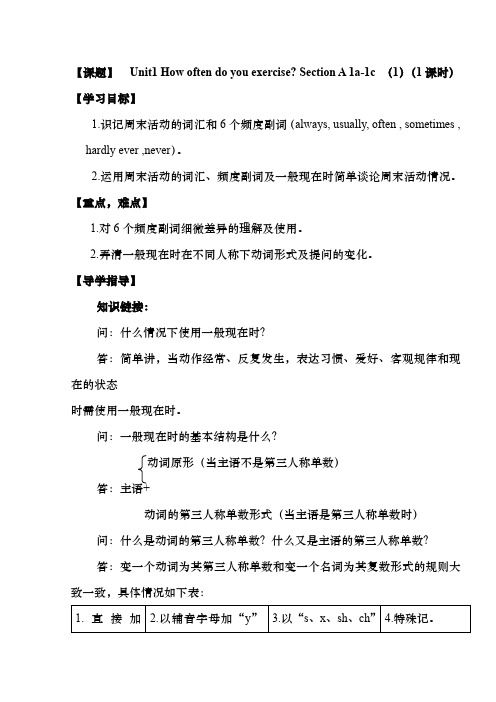
always从不,决不★
often几乎不☆(no star)
2.小组交流学习成果并讨论下列按频率高低顺序排列的表达是否正确(正确写T,错误写F)?若不正确,给出正确表达。
always>often>usually>sometimes>hardly ever>never.____
______>______>_____>______>_______>____.
5.Pair Work Show(展示对话)。
【课堂练习】
一、口译“自主学习一”所列词汇。
二、用所给词的适当形式填空。
1.Do you know Zhang Yining?Her ______(one)name is Yining and she surfs the Internet ______(one) a week.
【课题】Unit1 How often do you exercise? Section A1a-1c(1)(1课时)
【学习目标】
1.识记周末活动的词汇和6个频度副词(always, usually, often , sometimes , hardly ever ,never)。
2.运用周末活动的词汇、频度副词及一般现在时简单谈论周末活动情况。
知识链接:
一、将一个句子变为否定句的三个步骤:1、在要求变为否定句的句子中寻找be动词am、is、are、was、were,若有其中某个的话,在其后边加not即可(也可将其两个词缩写:is not=isn’t;are not=aren’t;was not=wasn’t;were not=weren’t)。2、若在要求变为否定句的句子中找不到am、is、are、was、were,就在其中寻找情态动词can、may、must、should、will、would、could、shall等,若有其中某个的话,就在其后加not即可(也可根据需要将其缩写:can not=can’t,must not=mustn’t, will not=won’t)。3、若在要求变为否定句的句子也找不到情态动词,就借助助动词do、does、did,第三人称单数借助does,不是第三人称单数借助do,一般过去时借助did,并在其后加not(分别可缩写成don’t、doesn’t、didn’t)后边的动词打回原形。
牛津深圳版八年级英语上册《Unit 1 Encyclopaedias》导学案(1)

《Unit 1 Encyclopaedias》导学案(第1课时)【学习目标】Mastery words and expressions理解两篇摘自一本百科全书的小文章【重难点预测】重点:通过学习本章的主阅读,学会介绍人物难点:抓住信息点【自主学习】1.()v.发明()n.发明()n.发明家()n.音乐()n.音乐家( ) adj.音乐的总结:以er、or和ian结尾的单词一般表示做这项职业的人。
eg:teach v.教——teach er教师act v.表演——act or演员Italia n.意大利——Ital ian意大利人2.英汉互译(1)intelligence (2)ability(3)include (4)suddenly(5)灭绝(6)去散步3.用线将下列单词和它的中文意思连起来。
ability A.包括born F.突然human B.没有人intelligence G.发明however C.人的sudden ly H.出生nobody D.能力invention I.获胜include E.然而win J.智慧合作交流根据两篇短文的介绍在文章中找出相关的信息。
Da Vinci,Leonardo1. Year of birth2. Year of death3. Career4. Life5. Main contributionsDinosaurs1. When and where they lived2. Appearance3. Food4. Current situation理解重点词汇和句子be bornhuman beingin the countrysideas...asDa Vinci was born in the countryside.From the early age, he showed great intelligence and artistic and sc ience ability. Some dinosaurs were as small as chickens. Others were as big as ten elephants. Nobody knows why. However, we can learn about them from their fossils.五.效果反馈1.他和我一样高(as...as)2. When somebody i s born, he/she_______a. comes out of his/her mother’s bodyb. goes to see a doctorc. leaves his/her parents3. Benny’s grandparents live in th e countryside. They live ___ the city.a inside b. outside c. in the centre of4. The book includes some beautiful photos. These photos are ______ the book.a. part ofb. at the end ofc. connect ed of5. A human being i s a(n) ______.a. animalb. machinec. person6. Birds have a musical ability. They ____ sing.a. singb. cannotc. are happy to六.熟悉全文,掌握两篇短文中介绍的关键信息。
仁爱英语八年级上册Unit1Topic1I‘mgoingtoplaybasketball._导学案
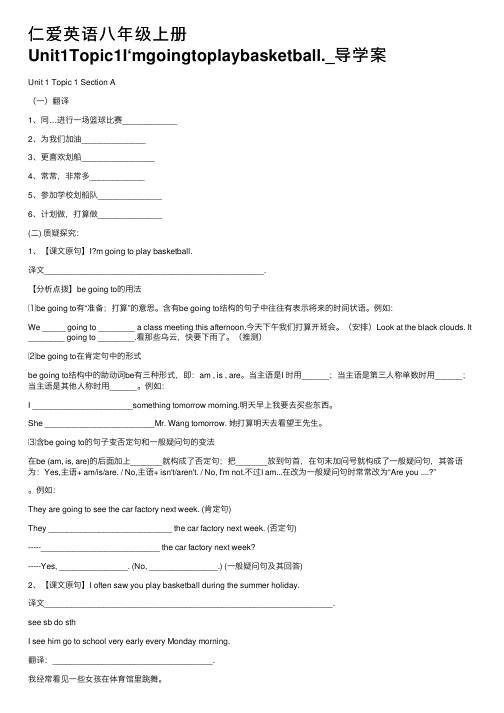
仁爱英语⼋年级上册Unit1Topic1I‘mgoingtoplaybasketball._导学案Unit 1 Topic 1 Section A(⼀)翻译1、同…进⾏⼀场篮球⽐赛____________2、为我们加油______________3、更喜欢划船________________4、常常,⾮常多____________5、参加学校划船队______________6、计划做,打算做______________(⼆) 质疑探究:1、【课⽂原句】I?m going to play basketball.译⽂________________________________________________.【分析点拨】be going to的⽤法⑴be going to有“准备;打算”的意思。
含有be going to结构的句⼦中往往有表⽰将来的时间状语。
例如:We _____ going to ________ a class meeting this afternoon.今天下午我们打算开班会。
(安排)Look at the black clouds. It ________ going to ________.看那些乌云,快要下⾬了。
(推测)⑵be going to在肯定句中的形式be going to结构中的助动词be有三种形式,即:am , is , are。
当主语是I 时⽤______;当主语是第三⼈称单数时⽤______;当主语是其他⼈称时⽤______。
例如:I ______________________something tomorrow morning.明天早上我要去买些东西。
She ________________________Mr. Wang tomorrow. 她打算明天去看望王先⽣。
⑶含be going to的句⼦变否定句和⼀般疑问句的变法在be (am, is, are)的后⾯加上_______就构成了否定句;把_______放到句⾸,在句末加问号就构成了⼀般疑问句,其答语为:Yes,主语+ am/is/are. / No,主语+ isn't/aren't. / No, I'm not.不过I am...在改为⼀般疑问句时常常改为“Are you ....?”。
仁爱版八年级英语上册导学案(全册)

仁爱版八年级英语导学案Unit1 Playing sportsTopic1 Are you going to play basketball? Section A学习目标:1.掌握Page1—2的单词,重点短语及句型。
2.熟练掌握“be going to +动词原形”的结构表示的一般将来时。
3.积极、主动的参与课堂。
学习重难点:1.一般将来时来时概念:表示将要发生的动作或存在的状态及打算、计划或准备做某事。
基本结构:be going to + do(动词原形);.句中一般有以下时间状语:(后tomorrow, next day(week, month, year…),soon, the day after tomorrow 天)等。
否定句:在be动词(am, is, are)后加not;一般疑问句:be提到句首,some改为any, and改为or,第一二人称互换。
例如:I’m going to have a picnic this afternoon.not going to have a picnic this afternoon.→ I’mWe are going to go on an outing this weekend.→ Are you going to go on an outing this weekend?2. see sb do sth “看见某人做某事” 表示看见事件、行动的全过程,动作已经结束。
看见某人正在做某事”强调事件正在进行。
see sb doing sth “3.have a … game against … “同…进行一场…比赛”4.cheer…on “为某人加油(喝彩)”5.-- Would you like to do sth?-- Sure, I’d love to.6. Me,too.自学引导:1、自学Page1-2的单词。
(根据音标拼读、拼写单词并牢记)。
八年级英语上册第一单元导学案
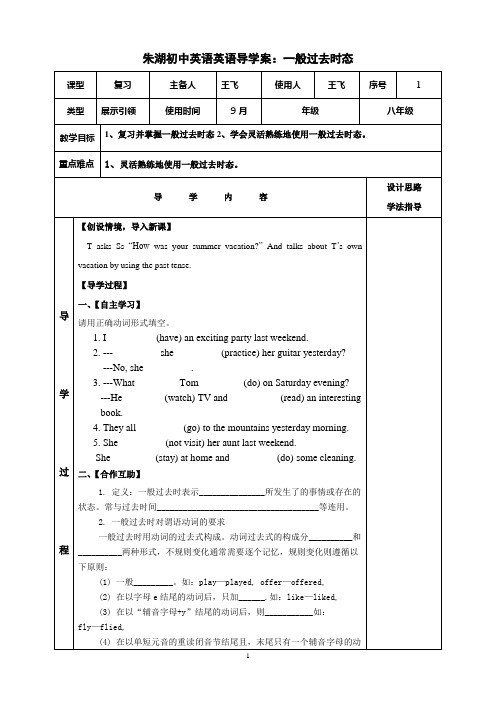
Did he go to theCentral Park?
3. ---What ________ Tom ________ (do) on Saturday evening?
---He ________(watch) TV and__________(read) an interesting
book.
4. They all _________(go) to the mountains yesterday morning.
Did you……
Yes, I did
No, I didn’t.
go with anyone
Play volleyball
Meet anyone interesting
Do anything interesting
三、【达标检测】
依照例句改写下列句子
A.e.g.He went to the Central Park.
2.一般过去时对谓语动词的要求
一般过去时用动词的过去式构成。动词过去式的构成分__________和__________两种形式,不规则变化通常需要逐个记忆,规则变化则遵循以下原则:
(1)一般_________。如:play—played, offer—offered,
(2)在以字母e结尾的动词后,只加______.如:like—liked,
(3)在以“辅音字母+y”结尾的动词后,则___________如:fly—flied,
(4)在以单短元音的重读闭音节结尾且,末尾只有一个辅音字母的动词后,_______________。如:plan—planned
三、【达标检测】
仁爱版八年级英语上册导学案(完整修改版)

仁爱版八年级英语上册导学案(完整修改版)Unit 1 Playing SportsTopic 1: Are You Going to Play Basketball?n AXXX:1.Master the words。
key phrases。
and sentence structures on Pages 1-2.2.Proficiently grasp the structure of "be going to + verb" to express the simple future tense.Key Points:1.Simple XXXConcept: XXX future。
ns。
plans。
or ns。
Basic structure: be going to + do (verb)。
XXX。
next day (week。
month。
year。
)。
soon。
the day after tomorrow。
etc.Negative form: add "not" after the auxiliary verb "be" (am。
is。
are).General n: move the auxiliary verb "be" to the beginning ofthe sentence。
change "some" to "any," "and" to "or," and swap the first and second person.For example: I'm going to have a XXX.I'm not going to have a XXX.We are going to go on an outing this weekend.Are you going to go on an outing this weekend?2."see sb do sth" means "XXX" and refers to the entire process of the event or n that has already ended.XXX" emphasizes that the event is XXX.3."have a。
八年级英语导学案Unit1Lesson1 What’s the weather like
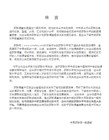
Lesson1 What’s the weather like ?学(学习目标)【学习目标】1. 掌握的词汇:rather storm rise (rose \risen) set2. 识别的词汇及短语:thunder sunrise sunset能力目标:能灵活运用所学词汇和句型描述各种天气情感目标:learn to make a weather report教学重点:重点短语和句型What’s the weather like ?It will be …/It is …What’s the temperature?教学难点: to make a weather report测(基础知识)1读课文,勾画出文中的重难点和疑难点,准备与同学共同探讨(1.)a weather report _____________(2.)degrees ________________ (3.)clouds__________ (4.)rather__________ (5.)shower_________ (6 )a thunder storm_________2 Read the text again and find out some useful expressions:on the radio_______________ (2)go down____________(3)come up__________________(4)相当凉爽___________________(5)我不希望如此________________(6)听我说_____________________(7)a good weather reporter_______________ (8)a weather report____________3. Read the text again and find out the meaning of the sentences: (小组展示)Is it going to rain today, Danny?_______________________________There will be some showers this afternoon._______________________________________Tell us what time it will rise and set!(4) It is ten degrees ____________________________(5) I hope not ____________________(6) )I am scared of thunder.________________________教(重难点)单词和词语探究snow课文原句:It’s not snowing. (2)There is some snow on the grass. (3)It will be snowy.思考:snow 有几种词性?______________________________________________Scared 课文原句:I’m scared of thunder!思考:你能写出同义句吗?________________________________________be scared/afraid to do sth 意为“害怕做某事”be scared/afraid that 后接句子rather课文原句:It’s rather cool today, isn’t it? 这是个反义疑问句,由两部分组成,中间用逗号隔开。
人教版八年级英语上册导学案(全册)

Section A 1a—1c内容:unit1 Where did you go on vacation? 课时:1课时编号:主编:英语组编写人:审核人:审批人;【学习目标】1、学会谈论过去发生的事件—学习一般过去时的用法2、掌握规则动词的变换规则3、熟记一些常用的不规则动词【学习重点、难点】1.复习一般过去时态的构成及用法;2.进一步学习一般过去时态针对地点的提问及回答;【学法指导】1、能向小组成员用英语介绍生活中的日常活动,如:stay at home , go to the beach, do my home work, watch TV, visit myuncle, go to New York, etc.2、运用一般过去时谈论过去的一天或一次旅行。
3.不规则动词过去式的归类记忆【教学过程】一、导入(启发探究3分钟)StepA、试一试你能写出下列各词的过去式吗?stay_________ do_________ stop_________play_________is_________ go_______ buy_______ have _______like_________ visit_________ are_________ carry_________StepB、快乐译一译stay at home_________ go to summer camp_________go to New York city______ go to the mountains_________visit my uncle_________ go to the beach_________visit museums _______Step C、考考你的迁移能力1. Lucy usually______to school early. But today she ______to school late. (go)2一What___________you__________(do) on your vacation last year?--–We___________(play) on the beach.3.I______ (call) you just now. But there_______ (be) no answer.4.Where __________you(study) at home las night? 一No, I__________(help)my mother__________(clean) the room.5. The students of Class One go to see the old woman __________ (one) a month.Step D、answer the questions:How was your summer vacation ?Where did you go on vacation?Who did you go there with ?What did you do there ?二、自学(自主探究6分钟)Step 1c师生、生生操练Where did you go on vacation? I went to New York City.Did you go out with anyone? No, No one was here. Everyone was on vacation. Did you buy anything special? Yes, I bought something for my father. How was the food? Everything tasted really good.Did everyone have a good time? Oh,yes. Everything was excellent. 三、交流(合作探究10分钟)Step 1a Reciting1.Read the phrases and know their meanings.stay at home_________ go to summer camp_________go to New York city______ go to the mountains_________visit my uncle_________ go to the beach_________visit museums _______2.finish the task:match the activities with the pictures.3.check the answers.4. students read and remember the phrases.Step 1b Listening1.students read the names.2. students guess their activities.3. finish the task:4. check the answers.5. students read and know the mmeaning of this passage.四、总结(引深探究15分钟)I、语法:一般过去时态的运用1.带有确定的过去时间状语时,要用过去时如:two days ago…、last yearin the old days just nowwhen I was 8 years old yesterdayDid you have a party yesterday?2 表示过去连续发生的动作时,要用过去时这种情况下,往往没有表示过去的时间状语,而通过上下文来表示。
人教版初二八年级上册英语Unit 1第一单元导学案教学案讲学稿
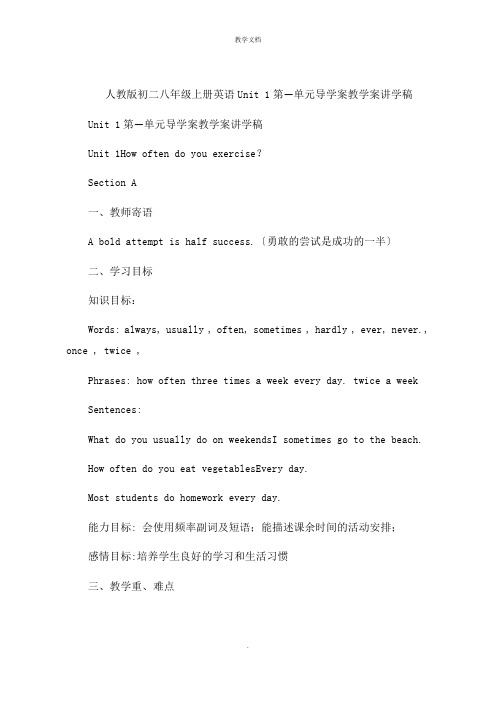
人教版初二八年级上册英语Unit 1第—单元导学案教学案讲学稿Unit 1第—单元导学案教学案讲学稿Unit 1How often do you exercise?Section A一、教师寄语A bold attempt is half success.〔勇敢的尝试是成功的一半〕二、学习目标知识目标:Words: always, usually , often, sometimes , hardly , ever, never., once , twice ,Phrases: how often three times a week every day. twice a week Sentences:What do you usually do on weekendsI sometimes go to the beach.How often do you eat vegetablesEvery day.Most students do homework every day.能力目标: 会使用频率副词及短语;能描述课余时间的活动安排;感情目标:培养学生良好的学习和生活习惯三、教学重、难点频度副词:always, usually, often, sometimes, hardly和never的应用疑问词how的用法四、学习过程1预习导学或自测Ⅰ.Look at the picture (学生识图).What do you usually do on weekends I sometimes go to the beach..I sometimes 去滑板看书看电视做运动购物Ⅰ.看图写出相应的頻度副词:2.自主学习Pairwork.How often do you eat vegetablesEvery day.ActivitiesHow ofena. go to the moviesEvery dayb. watch TVOnce a weekc. shopTwice a weekd. exerciseThree times a weeke.readOnce a weekTwice a week3.合作探究Ⅰ.maybe / may be①.The baby is crying she is hungry.②.The womana teacher .maybe是副词,意为“大概,可能,或许〞,一般用于句首。
八年级英语上册unit1where_did_you_go_on_vacation导学案
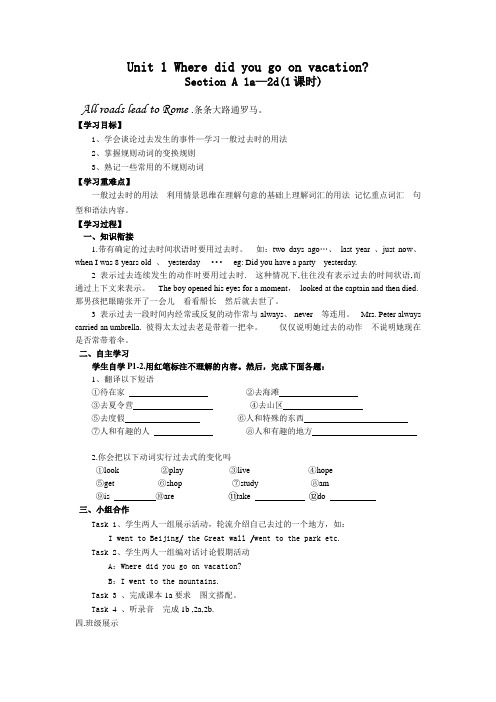
Unit 1 Where did you go on vacation?Section A 1a—2d(1课时)All roads lead to Rome .条条大路通罗马。
【学习目标】1、学会谈论过去发生的事件—学习一般过去时的用法2、掌握规则动词的变换规则3、熟记一些常用的不规则动词【学习重难点】一般过去时的用法利用情景思维在理解句意的基础上理解词汇的用法记忆重点词汇句型和语法内容。
【学习过程】一、知识衔接1.带有确定的过去时间状语时要用过去时。
如:two days ago…、last year 、just now、when I was 8 years old 、yesterday ···eg: Did you have a party yesterday.2 表示过去连续发生的动作时要用过去时. 这种情况下,往往没有表示过去的时间状语,而通过上下文来表示。
The boy opened his eyes for a moment,looked at the captain and then died. 那男孩把眼睛张开了一会儿看看船长然后就去世了。
3 表示过去一段时间内经常或反复的动作常与always、never 等连用。
Mrs. Peter always carried an umbrella. 彼得太太过去老是带着一把伞。
仅仅说明她过去的动作不说明她现在是否常带着伞。
二、自主学习学生自学P1-2.用红笔标注不理解的内容。
然后,完成下面各题:1、翻译以下短语①待在家②去海滩③去夏令营④去山区⑤去度假⑥人和特殊的东西⑦人和有趣的人⑧人和有趣的地方2.你会把以下动词实行过去式的变化吗①look__________②play___________③live____________ ④hope__________⑤get __________⑥shop__________ ⑦study _________ ⑧am_________⑨is ⑩are________ ⑪take ⑫do三、小组合作Task 1、学生两人一组展示活动,轮流介绍自己去过的一个地方,如:I went to Beijing/ the Great wall /went to the park etc.Task 2、学生两人一组编对话讨论假期活动A:Where did you go on vacation?B:I went to the mountains.Task 3 、完成课本1a要求图文搭配。
八年级英语上册全册导学案仁爱版

Unit 1 Playing SportsTopic 1 Are you going to play basketball?Section A第一部分词汇导学1. almost adv./adj. 几乎、差不多。
表示虽不完全是,但是几乎可以算是。
e.g. He watches TV almost every night. (adj.)He almost works out the problem. (adv.)2. against pre. (介)对着、反对。
带有反对、敌对的含义,常用的动词短语有:play against 和比赛,fight against 和打架/斗争,be against....反对/ 违背e.g. Everyone should fight against evil(罪恶).We will play basketball against Class 3 next week.3. cheer v. 为加油、欢呼,常用短语: cheer sb. one.g. We will cheer you on at the sports meeting.4. prefer v. 更喜欢,更愿意,宁愿。
常用短语和句型有:①prefer sth. /doing sth. 更喜欢/做I prefer ball games/playing ball games.②prefer sth./doing sth. to sth. /doing sth. (这里的to 是介词)I prefer dumplings to noodles.I prefer swimming to running.【同义】like better(than )I like swimming better than running.5. bit n. 一点,一些,少量。
常用短语:①a bit of , 相当于 a few/ a little , 修饰名词,也常用 a little bit ofe.g.: I can speak a little bit of English.② a bit 副词,可以用来修饰形容词/副词。
人教版八年级英语上册Unit1 导学案

八年级上册Unit 1 导学案Section A一、重点单词、短语、句型默写过关(课后组织默写)1、任何人2、在任何地方3、精彩的、绝妙的4、很少5、相当多6、最、最多、大部分7、某事、某物8、没有什么、没有东西9、每个人10、当然11、我自己12、你自己13、你们自己14、母鸡15、猪16、似乎、好像17、感到厌倦的、烦闷的18、某人19、日记,记事簿20、在度假21、待在家里22、去夏令营23、特别的东西24、见有趣的人25、有趣的事情26、打排球27、为考试学习28、和某人外出29、去有趣的地方30、拍照31、怎么样?好不好?32、大部分时间33、去购物34、唯一的问题35、写日记36、在农村37、上月我在度假38、大部分时间我待在家里看书和放松。
39、没有人在这里。
每个人都在度假。
40、所有东西尝起来真地很好。
41、晚上除了看书,没有什么事做。
42、为我自己买一些饮料或二、课文知识讲解1a-1c:词汇和短语(即背即写:在课堂上背记,课堂上默写)1、去度假2、去山里3、去海滩4、看望我的叔叔5、参观博物馆6、去夏令营7、待在家里8、度假9、过得愉快、玩得高兴10、优秀的,极好的2a-2d (一)词汇和短语(即背即写,课堂上背记,课堂上默写)1、Did you buy (特别的东西)for your father on Father’s Day ?2、Did Kevin (遇见有趣的人)?3、Did Julie (做了有趣的事情)?4、为考试学习5、和......一起出去6、好久不见。
7、Did you go (有趣的地方)?8、We (拍了相当多照片)last month.9、I (待)at home most of time (看书和放松). 10、大部分时间(二)不定代词:(somebody = someone某人、有人,something某事、某物,anybody=anyone 任何人、有人、某人,anything任何事物、某事、某物,nobody 没人,no one没人,nothing 没有东西,没有事情,everybody = everyone每个人,everything 每件东西,每件事情)1、不定代词都看成单数,做主语时,谓语一般用单数形式。
八年级英语上册unit1wheredidyougoonvacationsectiona1a-2dpe

八年级英语上册《Unit 1 Where did you go on vacation Section A 1a-2d period 1》导学案(学生版)姓名班级小组评价编号 :NO:1学习目标1.扎实记忆单词anyone,anywhere ,wonderful ,few, most .短语quite a few, go on vacation, stay at home,take a few photos.掌握询问某人有关去度假(一般过去时)的重要交际用语,初步学会不定代词。
2.通过听力训练,小组合作角色扮演的方式,学会在情景交际中练习语言点,并提高英语听说技能。
3. 学会与人分享度假的快乐。
重点、难点:1.一般过去时的用法2 .不定代词的用法【预习课】1.时段:(晚自习后十五分钟)2.预习内容及目标:预习课本P2页的单词及对话,扫清生词障碍并初步理解对话含义,初步了解形容词性物主代词。
3.方法指导: 先跟读单词3-5分钟, 独立记忆,默读对话并用红色笔画出新单词、重点短语和句型5分钟, 将预习中不能解决的问题标示出来。
最后请同学们合上课本独立完成下列各题,完成后对桌间相互批阅。
【互动课】Task1. Listening:听对话,完成1b.方法指导: 1、听第一遍录音,整体感知对话大意,尝试听懂语句表意。
2, 听第二遍录音,为图片编号,完成1b.3, 听第三遍录音,核对答案。
Task2. Speaking:(对话学习及运用)方法指导:1.大声练读1c对话至脱口而出:2. 模仿1c中对话,对桌互练。
小组长检查。
3. 利用本课对话范例中的句型,结合所学,创设情境自编新对话。
__________________________________________________________________________ _____________________________________ ____________________________________ _____________________________________ _____________________________________ _____________________________________ ____________________________________ Task3. Listening:听对话,完成2a,2b .方法指导: 1、听第一遍录音,整体感知对话大意,尝试听懂语句表意。
八年级英语上册第一单元导学案
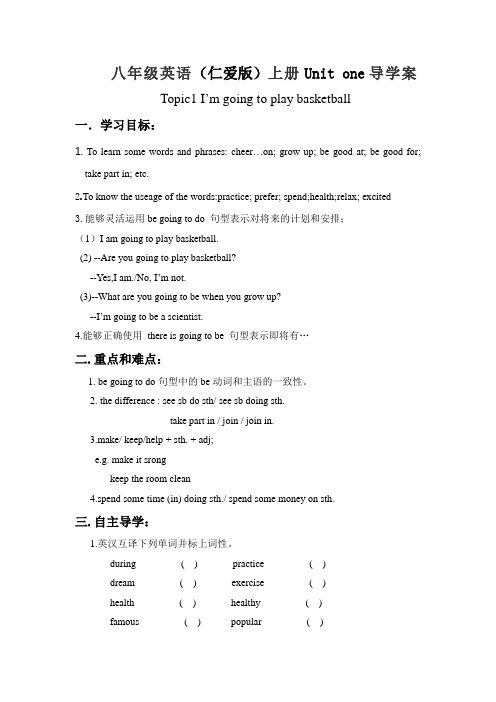
八年级英语(仁爱版)上册Unit one导学案Topic1 I’m going to play basketball一.学习目标:1. To learn some words and phrases: cheer…on; grow up; be good at; be good for; take part in; etc.2.To know the useage of the words:practice; prefer; spend;health;relax; excited3.能够灵活运用be going to do 句型表示对将来的计划和安排;(1)I am going to play basketball.(2) --Are you going to play basketball?--Yes,I am./No, I’m not.(3)--What are you going to be when you grow up?--I’m going to be a scientist.4.能够正确使用there is going to be句型表示即将有…二.重点和难点:1. be going to do句型中的be动词和主语的一致性。
2. the difference : see sb do sth/ see sb doing sth.take part in / join / join in.3.make/ keep/help + sth. + adj;e.g. make it srongkeep the room clean4.spend some time (in) doing sth./ spend some money on sth.三.自主导学:1.英汉互译下列单词并标上词性。
during_________( ) practice_________( )dream_________( ) exercise_________( )health_________( ) healthy_________( )famous_________( ) popular_________( )musician_________( ) jump_________( )对着;反对_________( ) 周末_________( )后天 _________( ) 科学家_________( )棒球_________( ) 遗憾_________( )激动的_________( ) 流行的_________( )2.在课本中找出下列短语划在书上并翻译。
- 1、下载文档前请自行甄别文档内容的完整性,平台不提供额外的编辑、内容补充、找答案等附加服务。
- 2、"仅部分预览"的文档,不可在线预览部分如存在完整性等问题,可反馈申请退款(可完整预览的文档不适用该条件!)。
- 3、如文档侵犯您的权益,请联系客服反馈,我们会尽快为您处理(人工客服工作时间:9:00-18:30)。
8年级Unit One 英语学案I. 根据句意及首字母提示,完成下列单词的拼写。
(10分)1. He writes to his parents t_______________ a month.2. Everyone in our class likes to surf on the I_______________.3. Do you know the r________________ of the race (赛跑)?4. Eating j_______________ food is bad for your health.5. Do you find out any d_______________ between the twin sisters?6. Sandy doesn't like basketball, so she h______________ plays basketball.7. If you want to keep h_______________, you should eat fruit and vegetables.8. You should not a______________ eat noodles for supper. You should try other food.9. You are not healthy, and you should change your l_______________.10. Mike is very lazy, he eats too much and never e_______________.II. 用括号中所给词的适当形式填空。
(10分)11. _______________ (Have) breakfast helps you keep healthy.12. I have some ______________ (knife). You can borrow one from me.13. He brushes his teeth ______________ (one) a day.14. My ______________(eat)habits are pretty good.15. You must eat more vegetables and ______________(little)meat.16. My mother ______________ (try) to make me to read more books.17. This movie is very _______________(interest)18. My mom wants me ________________(drink)milk every day.19. Tom usually________________ (have) meat and vegetables for dinner now.20. How often ______________ he _____________(read)English?III. 句型转换。
(10分)21. Mom does housework after supper.(改为否定句)Mom ___________ _____________ housework after supper.22. Lucy read English last night.(一般疑问句) __________ Lucy __________ English last night?23. I sometimes read storybooks.(画线部分提问)___________ ___________ do you read storybooks?24. There is a watch in the box.(复数形式) There ____________ ___________ ___________ in the box.25. Li Lei sleeps for nine hours every day.(对画线部分提问)____________ _____________ _____________ does Li Lei sleep every night?26. often, to, she, the, goes, movies (连词成句) ___________________________________.27. He doesn’t go to the park, I think.(改为同义句)I ____________ ____________ he ______________ to the park.28. We have a Chinese lesson on Monday, Tuesday, Wednesday, Thursday and Friday.(同义句) We have Chinese lessons ______________ _____________ a week.29. My sister is ill. I must take care of her at home.(改为同义句)My sister is ill. I must _______________ ________________ her at home.30. Jack usually eats fruit and vegetables for breakfast. (就划线部分提问)_____________ _____________ Jack usually ____________ for breakfast?( ) 31. Is your bike broken? Let __________ you.A. me to helpB. I helpC. me helpD. I to help ( ) 32. Although they feel tired, __________ they still go on working.A. andB. butC. /D. so( ) 33. The woman can't __________ his son in the park.A. readB. watchC. lookD. find( ) 34. Li Lei works in England. He comes to China __________.A. three time a yearB. three times a yearC. three times yearD. threetime year( ) 35. His grandmother is well because she often __________.A. exercisesB. smokesC. sleepsD. sings( ) 36. --- __________ do they play football? --- Every day.A. How soonB. How muchC. How manyD. How often( ) 37. His mother wants him __________ at home today.A. staysB. stayedC. to stayD. staying( ) 38. Here __________ the results __________ the student activity survey.A. is; withB. are; ofC. is; ofD. are; with( ) 39.__________ doing homework, we do their homework on Sunday.A. As forB. As toC. As ofD. As from( ) 40. These days Mrs Li looks __________ healthy.A. niceB. prettyC. heavyD. cool( ) 41.A: How often ___________ she exercise? B: Twice a week.A. doB. doesC. doingD. did( ) 42. I ___________ like to drink milk. A. not B. doesn’t C. don’t D. no( ) 43. Good food and exercise ___________ me to study better.A. to helpB. helpsC. helpingD. help( ) 44. Is her lifestyle the same ___________ yours or different?A. asB. inC. atD. to( ) 45. I like __________ for breakfast. A. a book B. a ruler C. an egg D. a sofa( ) 46. The ___________ are $21. A. glasses B. shoe C. table D. bike( ) 47. Tennis ___________ my favorite sport. A. are B. is C. amD. be( ) 48. I have a tennis and my friend Jim ___________ two tennis rackets.A. haveB. playC. playsD. has( ) 49. “Let’s play computer games.” “That ___________ interesting.”A. looksB. soundsC. listensD. reads( ) 50. My father likes football. But he ________ it. He only ________ football matches on TV!A. plays, watchesB. play, watchC. doesn’t play, watchesD. plays, doesn’t watchV. 根据汉语意思完成下列各句,每空一词。
(5分)51. 做眼保健操对你的眼睛没有害处。
